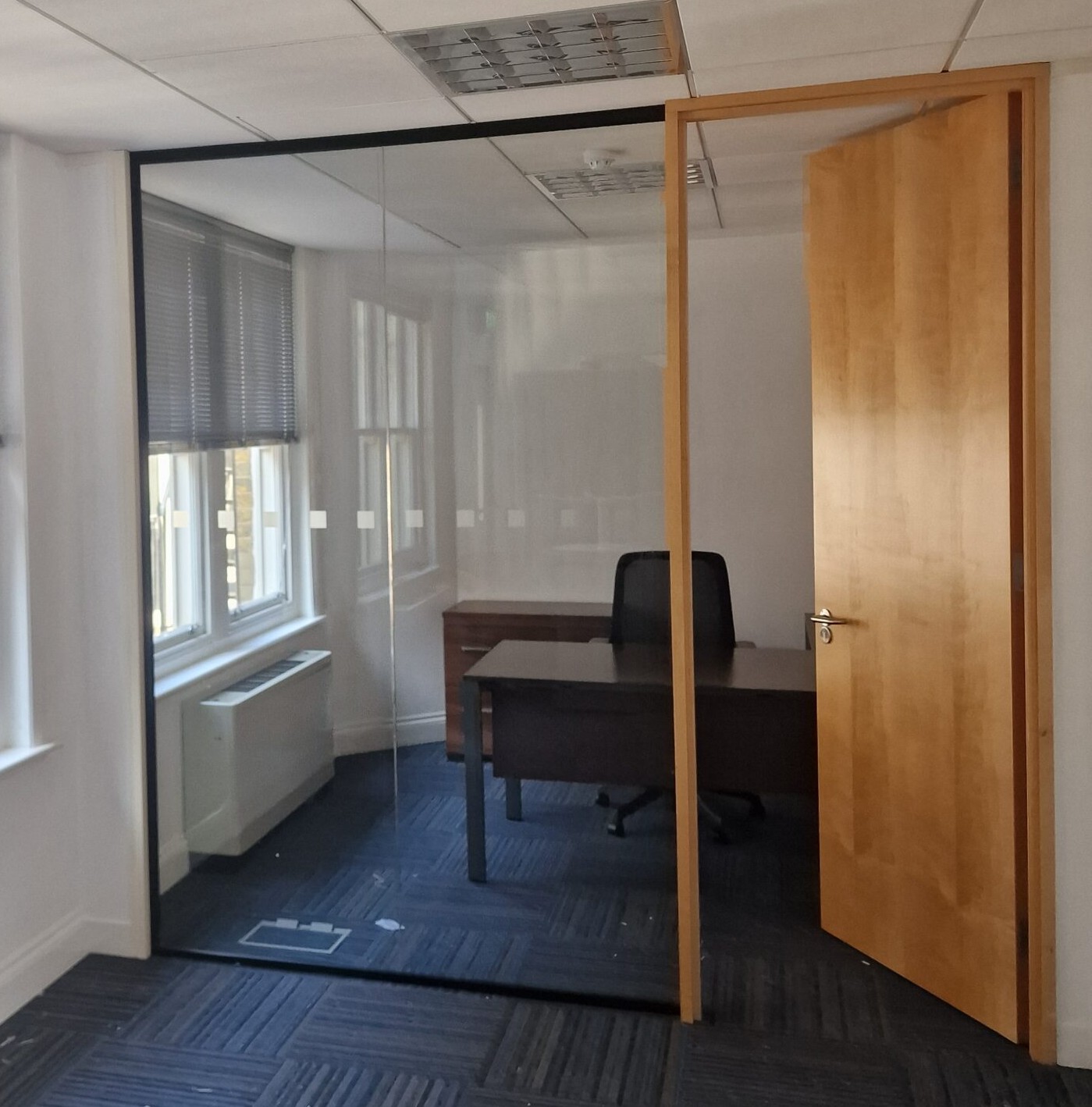
Black framed glass partitions are a classic design, often chosen for their modern aesthetic and clear division of space. But they are not the only option. Today, we have a wide range of partitioning systems, each with its own strengths, applications, and character. This guide explores alternatives that go beyond the black frame, looking at frameless, aluminium, timber, drywall, and steel systems and how they can be adapted to your commercial space.
1. Frameless Glass Partitions
Frameless glass partitions are defined by continuity. With minimal fixings and no visible framework, they create an uninterrupted sweep of glass that opens interiors and brings natural light deep into the space. This clean effect is particularly popular in corporate offices, coworking hubs, and creative studios where collaboration and visibility are priorities. Despite the absence of frames, frameless systems are engineered with toughened glass and precision hardware that ensure strength and stability. They can also be adapted to include sliding or pivot doors, as well as acoustic seals for better sound control. For businesses looking for openness without sacrificing practicality, frameless partitions are a versatile option.
Explore: Frameless Glass Partitions
2. Aluminium-Framed Glass Partitions
Aluminium-framed partitions offer a balance of strength and lightness that makes them one of the most adaptable systems available. Unlike steel, aluminium is corrosion-resistant and easy to work with, meaning it can be finished in almost any colour through powder coating. This makes it well-suited to workplaces that want to reflect brand identity or align with interior palettes. Its resilience has made aluminium a common choice in technology offices, healthcare facilities, and retail environments where durability and hygiene matter. Maintenance is minimal, requiring little more than occasional cleaning, and the flexibility of the frame design allows for both straight and curved layouts.
See more: Aluminium-Framed Partitions
3. Timber-Framed Glass Partitions
Where glass can sometimes feel cold or impersonal, timber framing introduces warmth and tactility. Combining glass with wood results in partitions that feel more welcoming, making them an ideal fit for interiors inspired by hospitality or biophilic design. Whether in boutique hotels, wellness centres, or cafes, timber partitions soften the edges of commercial spaces and create an inviting atmosphere. Different wood species, from pale oak to rich walnut allow for subtle shifts in tone and style, while finishes can be chosen to complement the overall design. Unlike aluminium or steel, timber will age gracefully, developing a patina over time, though it does require care and treatment to maintain its performance.
4. Solid or Drywall Partitions
Sometimes transparency is less important than separation. Solid or drywall partitions provide complete visual and acoustic division, making them invaluable in environments where focus and confidentiality are essential. Call centres, warehouses, and back-office spaces often benefit from these systems, as they block noise and create areas where concentration can thrive. Their advantage lies not only in soundproofing but also in adaptability: drywall can be painted, panelled, or fitted with acoustic finishes to enhance performance. For businesses needing more than just separation, these partitions can incorporate shelving, storage, or integrated design features. They also tend to be more cost-effective than glass systems, offering excellent value for large-scale office fit-outs.
5. Industrial-Style Steel Partitions
Steel partitions make a statement that lighter materials cannot. Their strength allows for slim yet robust frames that support large panes of glass, giving interiors a bold, structured character. Unlike aluminium, steel has a density and permanence that feels rooted in industrial heritage, making it a popular choice for loft-style offices, creative agencies, and retail showrooms. While the black steel frame is a classic look, these partitions can also be powder-coated for different finishes, extending their design range. They require more attention to finishing than aluminium galvanising or powder coating prevents corrosion, but in return, they deliver a system that is both durable and distinctive.
Final Thoughts
There is no single “best” alternative to black framed glass partitions. The right solution depends on the function of your space, your budget, and the atmosphere you want to create. Frameless systems maximise openness, aluminium frames bring flexibility, timber adds warmth, drywall offers complete separation, and steel delivers strength and identity. Each comes with its own performance profile, making it worth seeking professional advice before deciding.
FAQs
Yes, when installed with quality hardware and toughened glass, frameless systems can be just as durable as framed versions.
.
Absolutely. Many commercial interiors blend solid walls for privacy with glass partitions for light and openness.
Solid partitions typically cost less than glass options, though pricing depends on materials and finishes.
Yes, aluminium frames can be powder-coated in black or other colours for a similar look to steel.
Standard sliding glass is less effective for soundproofing than fixed panels, but acoustic sliding systems are available.














